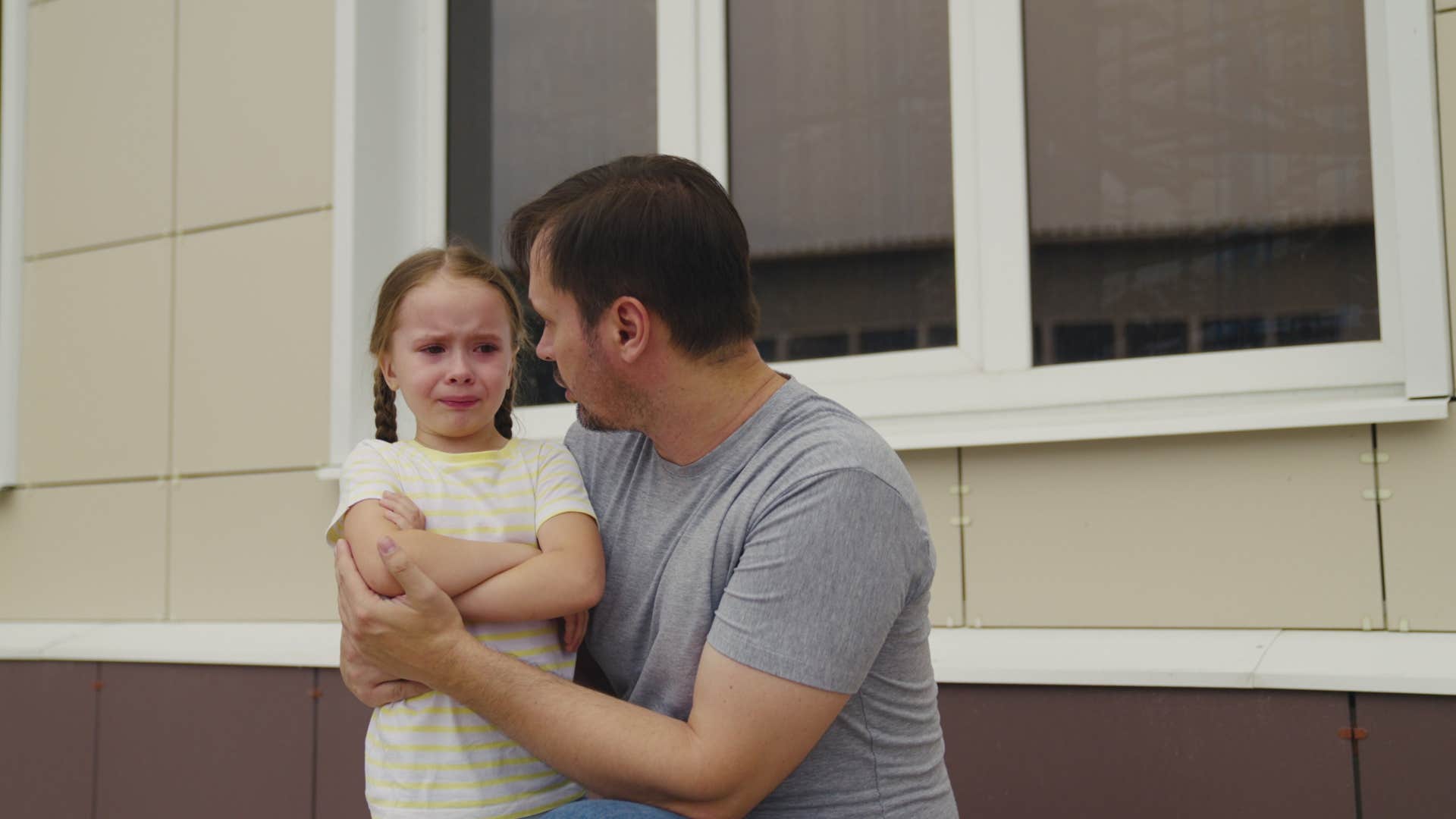Parents Who Do These 11 Things Raise Mentally Weak Children Whether They Realize It Or Not
Even with the best intentions, parents can quietly sabotage their children.
 fast-stock | Shutterstock
fast-stock | Shutterstock Especially early in a child's life, when their brains are rapidly developing and soaking up the most information, parents must make space to teach their kids emotional intelligence. Whether it's modeling healthy behavior around mental health, teaching them how to regulate, or even having hard conversations that equip them with communication skills, parents have the power to set their kids up for later success by prioritizing mental stability and intelligence.
However, there are also several behaviors — from solving all problems to being avoidant — that set kids up to experience more anxiety, uncertainty, and disconnection. Parents who do these things raise mentally weak children whether they realize it or not, taking away opportunities for them to learn and soak up productive information about how to best care for themselves, build relationships, and navigate everyday life.
Parents who do these 11 things raise mentally weak children whether they realize it or not
1. Solve all their problems for them
 LStockStudio | Shutterstock
LStockStudio | Shutterstock
Parents who solve all of their children's problems for them not only take away important feelings of agency and autonomy, but they also reinforce the misguided belief that they're incapable of handling hard circumstances and issues on their own. Whether it's navigating an argument with a friend or talking to a teacher about a poor test score, children with overbearing parents who always "save the day" encourage their kids to miss out on growth opportunities.
Of course, parents should feel empowered to help and support their kids every once in a while, but sometimes, giving them a moment of discomfort or anxiety around something teaches them the power of preparation, emotional regulation, and confidence down the road.
2. Shield them from discomfort
 Valery Zotev | Shutterstock
Valery Zotev | Shutterstock
We learn how to be more resilient and self-assured when we handle adversity on our own, according to a study from Frontiers in Psychiatry, which is why it's so important for children to experience discomfort and fear occasionally in their lives. According to neurology professor Dr. Richard E. Cytowic, shielding kids from discomfort only encourages them to disconnect from reality and their own emotional awareness.
When kids don't know what's happening in the world, their own families, or their routines, they're less optimistic. They have to have a baseline level of understanding and coping skills to thrive and be informed while navigating their lives. However, parents who do things like avoiding and shielding discomfort at home raise mentally weak children, whether they realize it or not, who are incapable of protecting, advocating, and regulating themselves in the face of uncertainty or change.
3. Hide arguments and hard conversations from them
 fizkes | Shutterstock
fizkes | Shutterstock
Children learn how to craft relationships and engage with others largely from the modeled behaviors they see at home — whether that's their parents, grandparents, or guardians. The same is true for mental health responses like anxiety, according to a study from Behavior Research and Therapy. Kids who grow up around constantly anxious or depressed parents who refuse to talk about it, learn to respond and suppress in similar ways.
That's why parents who hide their arguments with partners or avoid hard conversations with their kids ultimately harm them in the long run — encouraging them to be mentally weaker than counterparts who have the communication, empathy, and regulation skills to navigate these situations later in life.
Even if it's having a surface-level argument in front of the kids, engaging in healthy conflict-resolution skills, and apologizing to one another, these experiences are profoundly important for shaping their relationships now and in the future.
4. Never say 'no'
 Ground Picture | Shutterstock
Ground Picture | Shutterstock
According to family therapist Sarah Epstein, parents who never say "no" to their kids may simply seem generous on the surface, but this lack of boundaries at home is actually one of the things that raises mentally weak children, whether they realize it or not. She argues that this "boundaryless relationship" not only encourages children to misbehave and act entitled, but also encourages adult children to struggle with questioning their relationships later in life.
Whether it's staying up late, asking for money, or misbehaving, parents who say "no" protect their own well-being, while also reminding their kids to practice emotional regulation in the face of their own frustration or disappointment. Without these mental and emotional skills, they'll inevitably struggle with mental health and relationships down the road, expecting the same kind of flippance and constant access that their parents offered from others.
5. Never talk about emotions
 PeopleImages | Shutterstock
PeopleImages | Shutterstock
Emotional competence is the key for children to develop better mental health, personal well-being, and relationships, according to a study from Development and Psychopathology. But how do parents actually cultivate this kind of intelligence and self-awareness in their kids?
For starters, it starts with being open and communicative about mental health — not only modeling healthy habits and openness around their kids, but having conversations and check-ins with them about their own.
Children who don't have the opportunity to learn emotional regulation practices through these kinds of conversations not only develop misguided beliefs about their own mental health, but they also are at a higher risk for suppression and internalization of complex emotions and feelings later in life, as another 2002 study explains.
6. Punish mistakes
 DimaBerlin | Shutterstock
DimaBerlin | Shutterstock
When parents punish their children for their mistakes in everyday life, rather than offering them opportunities to learn and grow from them, they instill a kind of avoidance, anxiety, and disconnection. Not only does this encourage children to forgo things like asking for help or accepting the benefits of making mistakes in adulthood, it urges them to conceal and hide things as children.
The first step to helping kids achieve a healthier mindset and a mentally strong mentality around making mistakes is to talk about them openly. Don't immediately punish or shame a child for making a mistake — first, figure out why they made it or how they can grow from it.
7. Never set boundaries
 PeopleImages | Shutterstock
PeopleImages | Shutterstock
Kids who don't have boundaries at home often develop a sense of entitlement to other people's space, time, energy, and attention. They're never told "no" or offered opportunities to learn empathy, so instead, they operate from a mentally weak framework of self-centeredness and greed.
Especially when a lack of boundaries encourages children to experience more anxiety and uncertainty at home, alongside a lack of emotional regulation skills from navigating the discomfort of respecting other people's boundaries, it can create more harm for kids than comfort.
8. Rescue them from consequences
 fizkes | Shutterstock
fizkes | Shutterstock
When parents always come to their kids' rescue — especially when they're facing the consequences of their own misbehavior or ignorance — it doesn't encourage them to learn from their mistakes, but rather to continue engaging in bad behavior. Whether it's at school or a friend's house, parents who make excuses for their kids don't allow them to learn emotional regulation skills or even the value of accountability.
Even if kids are making the wrong decisions or misbehaving, that's not always a bad thing, as long as parents allow them to learn and grow.
9. Avoid conflict and hard conversations
 Miljan Zivkovic | Shutterstock
Miljan Zivkovic | Shutterstock
Family conflicts and arguments are inevitable. However, it's actually the repair and accountability that follows that defines the health of family relationships and the strength of children's coping skills, not the frequency of arguments at home. So, parents who avoid conflict with their kids are raising mentally weak children whether they realize it or not, taking away opportunities for them to learn how to communicate, apologize, and regulate themselves.
"Relationships shrink to the size of the field of repair," psychologist Rick Hanson argues. "But a bid for a repair is one of the sweetest and most vulnerable and important kinds of communication that humans offer to each other... It says you value the relationship."
10. Dismiss their opinions
 PeopleImages | Shutterstock
PeopleImages | Shutterstock
When parents create an unhealthy power structure in a relationship — crafting themselves as a pillar of authority, rather than support or affection — they can encourage their children to struggle with autonomy and independence. Authoritative and overbearing parents dismiss their kids' opinions often in everyday life, rewarding them for following orders, rather than thinking for themselves.
Parents who do these things — whether it's following a transactional parenting style or punishing their kids for making personal decisions — raise mentally weak children, because they strip them of their sense of independence and confidence.
11. Guilt-trip them
 MAYA LAB | Shutterstock
MAYA LAB | Shutterstock
Even if the intention behind guilt-tripping behaviors is sincere — like trying to protect personal sanity or their kids from harm — it can have long-term consequences for children's well-being and mental health. Instead of teaching kids how to think for themselves, make informed decisions, and learn from their mistakes, these kinds of parents instead weaponize shame to get them to follow orders.
Not only does this shame tend to live with kids into adulthood and spark disconnection in their family dynamics, it ensures that kids enter into adulthood without the critical thinking, emotional regulation, and conflict-resolution skills they need to thrive.
Zayda Slabbekoorn is a staff writer with a bachelor's degree in social relations & policy and gender studies who focuses on psychology, relationships, self-help, and human interest stories.

